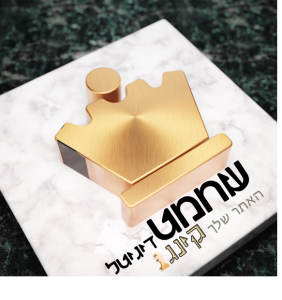Vaera-HOW TO BE HEALTHY
HOW TO BE HEALTHY
Some people are so disturbed by wrongdoing that they cannot stand aside or pretend not to see. That was the case with Moshe.
When Moshe grew up he went out to his brethren and observed their burdens. He saw an Egyptian striking a Hebrew – one of his brethren… So he killed the Egyptian and hid him in the sand. He went out the next day, and behold, two Hebrews were fighting. He said to the instigator, “Why do you strike your fellow?” but he received a scathing response to his intervention: “Do you mean to kill me as you killed the Egyptian?” (Ex. 2:14). Moshe became alarmed and said, “Then the matter is known.”
What was this “matter” that had become “known”? According to the plain sense of the text,Moshe realised that there were witnesses to him having killed an Egyptian and the matter of the killing was public knowledge. The Midrash, however, finds another, hidden level of significance in Moshe’s response: he was deeply troubled by the issue of what sin had the Israelites committed that resulted in them becoming enslaved to another people? Moshe had been questioning the matter of the exile. Why must the Hebrew nation suffer beneath the oppressive hands of the Egyptians?
When he heard the comment of the instigator, however, he said: “now it is known”. He realized that Israelites would, at the slightest provocation, speak Lason Hara (malicious gossip) about one another [the two fighters threatened to report his killing of the Egyptian] – that is why the Jews had to suffer! (Exodus Rabboh)
What a remarkable and meaningful lesson we have here of the destructive power of Lason Hara. After witnessing two Jews speaking Lason Hara, there remained no question in Moshe Rabbeinu’s mind as to the root cause of the Jewish suffering. Indeed, the matter was known! Lason Hara destroys the fabric of a society and removes the ability to be independent and improve the situation of the people, because of the internal disintegration that it creates.
Rashi cites this Midrash after quoting the plain meaning. He made a statement regarding the status of the Children of Israel throughout history, Reb Naftali Tzvi of Ropshitz The Ropshitzer Rav, in his sefer Zera Kodesh (parshas Bo) finds an allusion to the concept of shemiras ha-loshen (guarding one’s tongue) in the very word Mitzrayim (Egypt) . The Torah She-ba’al Peh (the Oral Law) begins with the letter Mem (the first word of the Shishah Sidrei Mishnah/Six Orders of the Mishnah is “Mei-eimasai”). The letter Mem, when placed at the beginning (or middle) of a word is called a “Mem pesuchah”, an “open” Mem, because, when written, there is a space at the bottom of the letter. Likewise, Torah She-ba’al Peh ends with the letter Mem (the last word of Maseches Uktzin, the last tractate of the Mishnah, is “Shalom”). The letter Mem, when placed at the end of a word, is called a “Mem sesumoh”, a “closed” Mem, because when written, the letter has no space whatsoever – it is a closed square.
This is no coincidence. Our Sages, (Chazal) say “What should a man’s pursuit in this world be? He should be silent” (Chullin 89a).To make himself as the mute [He should be silent in order refrain from speaking Lason Hara]. One might think [that this pertains] even to speaking words of the Torah (Divrei Torah)! No! Righteous words (i.e. words of Torah) you shall speak!” The gift of speech was given to us not so that we should while away our time with idle chatter, and even worse, with harmful gossip, but so that we should be able to converse and interact with others in Torah study and character improvement. That’s why the Oral Torah (the “Torah of the Mouth”) begins with a “open Mem” – When you open your mouth it should be in order to speak words of Torah. It concludes with a “closed Mem”, as if to say, when you have finished learning, close your mouth, and go back to being as the mute.
What happens, continued the Ropshitzer, if one opens his mouth to speak Divrei Torah, and then the evil inclination (the “Yetzer Hora”) mixes in and convinces him to speak unholy words – words of gossip and slander? Well, when you put the letters Yetzer (Yud – Tzaddik – Reish) between the “open” and the “closed” Mem? It spells “Mitzrayim” – the Egyptian Exile!
In a letter was sent by the Gaon, R. Eliyahu of Vilna, zt’l while traveling to Eretz Yisroel, to encourage and instruct his family in the ways of Mussar (Ethics). He writes that if a person finds himself in a situation where he has great desire to speak loshen hora and to gossip about someone, and he restrains and, so to speak, muzzles himself, this is much greater even than fasting and other types of physical suffering, which are known to effect forgiveness “And that is worth more than any amount of fasting and self-affliction! For every second that man controls his tongue, he merits some of the “hidden [by Hashem for the righteous] light,” something which no angel or [other] creature can imagine (Midrash).”
All too often we say things without thought or think after we have denigrated someone. We can always apologize but can one ever make things right? Read the following story.
There once was a little boy who had a bad temper. His Father gave him a bag of nails and told him that every time he lost his temper, he must hammer a nail into the back of the fence. The first day the boy had driven 37 nails into the fence. Over the next few weeks, as he learned to control his anger, the number of nails hammered daily gradually dwindled down. He discovered it was easier to hold his temper than to drive those nails into the fence. Finally the day came when the boy did not lose his temper at all.
He told his father about it and the father suggested that the boy now pull out one nail for each day that he was able to hold his temper. The days passed and the young boy was finally able to tell his father that all the nails were gone. The father took his son by the hand and led him to the fence. He said, “You have done well, my son, but look at the holes in the fence. The fence will never be the same. When you say things in anger, they leave a scar just like this one. You can put a knife in a man and draw it out. But it won’t matter how many times you say I’m sorry, the wound will still be there. A verbal wound is as bad as a physical one.” The Mishnah in Pirkei Ovos (1:17), “Rabbi Shimon, the son of Rabban Gamliel, said: All my days I have grown up among the Sages, yet I have never found anything good for the body except silence.” Certainly silence is good for the neshomoh, for the soul. But why did Rabbi Shimon remark that he had not found good “for the body” except silence? As we have seen, however, the silence which comes as a result of refraining from gossiping, even when it is really tempting to do so, replaces even the most severe forms of punishment to suffer to effect forgiveness for his sins. Thus, “silence” is indeed healthy not only for the neshomoh, but even for the body!
Reb Naftali Tzvi of Ropshitz
The Ropshitzer used to speak about the great yichus he had from both sides of his family and he named his sefer Zera Kodesh because of the great yichus he had
The Ropshitzer is quoted as having said that yichus is like a lot of zeros. Until you put a one (meaning yourself) in front of it, it is still zero. After you place a 1 there, meaning making something of yourself, it can become a very large number

 שחמט דיגיטל
שחמט דיגיטל